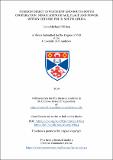Files in this item
Foreign direct investment and South-South cooperation : negotiating space, place and power within Chinese FDI in South Africa
Item metadata
| dc.contributor.advisor | Clayton, Daniel Wright | |
| dc.contributor.advisor | Kesby, Mike | |
| dc.contributor.author | O'Brien, Liam M | |
| dc.coverage.spatial | [14], 236 p. | en_US |
| dc.date.accessioned | 2019-06-10T10:54:41Z | |
| dc.date.available | 2019-06-10T10:54:41Z | |
| dc.date.issued | 2019-06-26 | |
| dc.identifier.uri | https://hdl.handle.net/10023/17854 | |
| dc.description.abstract | Chinese Foreign Direct Investment (FDI) in South Africa is indicative of a two-fold transformation in the contemporary development landscape: the rise of South-South Cooperation (SSC) and a re-centering of economic growth as a driver of development. However, to attract investment, and accrue developmental opportunities, hosts must first offer an enabling environment. Where an enabling environment does not presently exist, it must be actively produced. This is undertaken by a range of actors and against multiple and contested priorities. FDI, therefore, cannot be understood without an appreciation of the intimate, yet understudied, negotiations over space and place. Through the use of semi-structured interviews, field observations, and documentary analysis at the location of three differing Chinese investments in South Africa – including a Chinese SOE within an economic zone, a mining partnership with a traditional rural community, and a ‘new city’ development led by a private Chinese investor – the thesis asks how space and place is produced to support investment, the location of agency, and the limits realities place upon the role of FDI in SSC. Findings show that, whilst space and place were often co-produced and actively negotiated between host and investors, motivations and priorities were aligned to a need to provide spaces of comparative and competitive difference within wider international political economy. The structural production of space and place in this way created new dependencies and further uneven development. This had implications for a host ability to develop in accordance with their own values and objectives. Conclusions suggest FDI in the development landscape limits the radical potential of SSC. The thesis applies geographic theory in a context not yet seen and, through bringing together Chinese and South African voices in a single study, contributes original empirical data from underrepresented voices in scholarship on China-Africa relations. | en_US |
| dc.language.iso | en | en_US |
| dc.publisher | University of St Andrews | en |
| dc.rights | Attribution-NonCommercial-NoDerivatives 4.0 International | * |
| dc.rights.uri | http://creativecommons.org/licenses/by-nc-nd/4.0/ | * |
| dc.subject | China-Africa relations | en_US |
| dc.subject | International development | en_US |
| dc.subject | South-South cooperation | en_US |
| dc.subject | Foreign direct investment | en_US |
| dc.subject | Postcolonialism | en_US |
| dc.subject | Space and place | en_US |
| dc.subject | South Africa | en_US |
| dc.subject | China | en_US |
| dc.subject | Capitalism | en_US |
| dc.subject | Power | en_US |
| dc.subject | Aid | en_US |
| dc.subject.lcc | HG5851.A3O3 | |
| dc.subject.lcsh | Investments, Foreign--South Africa | en |
| dc.subject.lcsh | Economic development--South Africa | en |
| dc.subject.lcsh | China--Foreign economic relations--South Africa | en |
| dc.subject.lcsh | South Africa--Foreign economic relations--China | en |
| dc.subject.lcsh | Economic development--South Africa | en |
| dc.title | Foreign direct investment and South-South cooperation : negotiating space, place and power within Chinese FDI in South Africa | en_US |
| dc.type | Thesis | en_US |
| dc.contributor.sponsor | University of St Andrews. 600th Anniversary Scholarship | en_US |
| dc.type.qualificationlevel | Doctoral | en_US |
| dc.type.qualificationname | PhD Doctor of Philosophy | en_US |
| dc.publisher.institution | The University of St Andrews | en_US |
| dc.identifier.doi | https://doi.org/10.17630/10023-17854 |
The following licence files are associated with this item:
This item appears in the following Collection(s)
Except where otherwise noted within the work, this item's licence for re-use is described as Attribution-NonCommercial-NoDerivatives 4.0 International
Items in the St Andrews Research Repository are protected by copyright, with all rights reserved, unless otherwise indicated.


